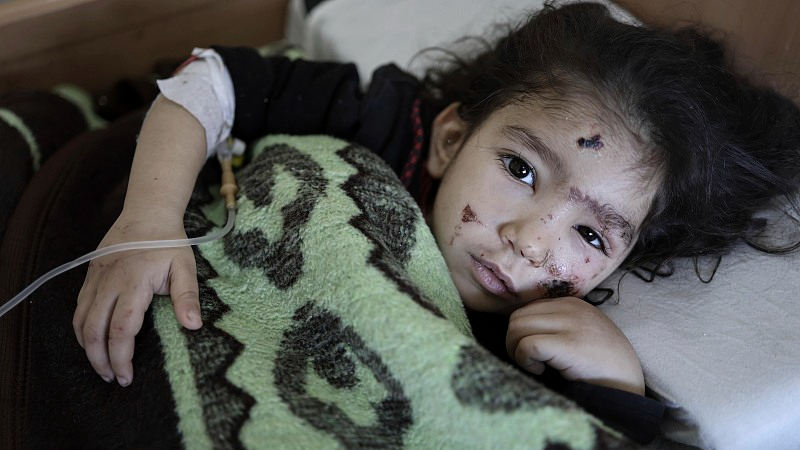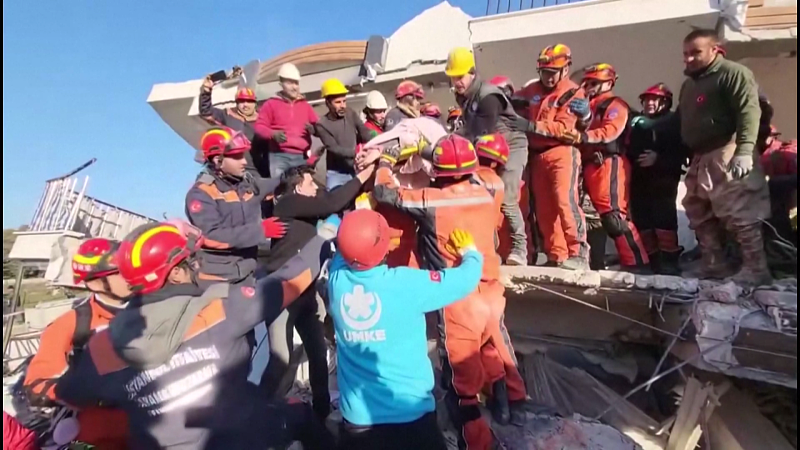
A survivor of the devastating earthquake was being treated at Idlib's university hospital in Syria, February 10, 2023. /CFP
A survivor of the devastating earthquake was being treated at Idlib's university hospital in Syria, February 10, 2023. /CFP
Editor's note: Thomas O. Falk is a London-based political analyst and commentator. He holds a Master of Arts in international relations from the University of Birmingham and specializes in U.S. affairs. The article reflects the author's opinions and not necessarily the views of CGTN.
The earthquake in Türkiye and Syria struck a region hard hit by international conflict. The world community must not differentiate between Syria and Türkiye, and the actors present in the region must place their interests aside for hope and help to prevail.
"On behalf of the Greek people, I have expressed my heartfelt condolences," Greece's Prime Minister Kyriakos Mitsotakis tweeted after a phone call with Türkiye's President Recep Tayyip Erdogan. Athens stands ready to provide further assistance, he added.
It's a positive sign that the devastating earthquakes in Türkiye and Syria have brought rivals Greece and Türkiye closer together. The phone call was the first conversation between Erdogan and Mitsotakis in nearly a year. In August and September 1999, severe earthquakes shook northwest Türkiye and Athens, one after the other. The first Greek rescue teams helped Türkiye, while Turkish rescuers came to Greece. The disasters brought the two countries closer together back then as well.
Additionally, more rapprochement between Greece and Türkiye is required. The death toll in the recent earthquake has already surpassed 22000, and the material damages cannot even be quantified at the moment. Fortunately, people from all over the world are supporting Türkiye by delivering substantial funds and aid to the country. Volunteers from worldwide are on site, which are terrific signs of courage and hope.
Nevertheless, the question of whether global support is reaching Türkiye and northern Syria in equal measure remains unclear. It depends on whether one can understand one another and – for the moment – forget geopolitical interests. Accordingly, it should theoretically make no difference whether the victims come from Türkiye or Syria. But in reality, it does make a difference.

A Chinese and Turkish rescue team rescued a woman in Antakya, Hatay Province, southern Turkey, February 9, 2023. /CFP
A Chinese and Turkish rescue team rescued a woman in Antakya, Hatay Province, southern Turkey, February 9, 2023. /CFP
The disaster area itself runs along the border between southern Türkiye and northern Syria. Syria has confronted a bloody civil war for almost 12 years and stands at the epicenter of a highly volatile region. Therefore, too many actors attempt to push their own geopolitical interests in this region.
This status quo poses incredible challenges for aid organizations and international politics alike, since volunteers from around the world could be entering a cauldron of conflict and violence. Hence, the rescue measures in Türkiye could start immediately, while in northern Syria, people facing shortages of the bare essentials, as well as professional aid workers and equipment.
The affected areas in Syria's war-torn northwestern region are difficult to reach. Six trucks with aid supplies from the United Nations arrived on February 9. According to the UN, they came from Türkiye and passed through the only open border crossing, Bab al-Hawa. Additionally, Russia, China, India, the United Arab Emirates and Iran, among others, have delivered aid to the country.
It will be decisive whether Türkiye supports rescue workers in the Kurdish areas and whether Syria clears the way for help in rebel areas. The airports and borders must open up so that volunteers can deliver rescue equipment and supplies to where they are needed most.
Yet, Western-imposed sanctions on Syria are hampering aid to the country. The Syrians have gotten punished by the sanctions regime of the EU and U.S. for years. And in times of disaster, the impact will be much more devastating. Help for them has become a priority, while selfish geopolitical interests should be curbed at the moment.
If not, we'll face another political catastrophe in the midst of this humanitarian catastrophe and miss the opportunity to make diplomatic advances where they are needed the most.
(If you want to contribute and have specific expertise, please contact us at opinions@cgtn.com. Follow @thouse_opinions on Twitter to discover the latest commentaries in the CGTN Opinion Section.)